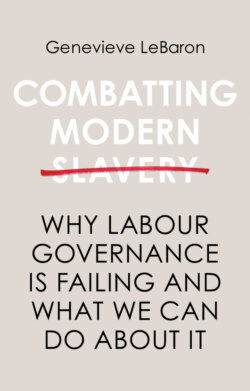Читать книгу Combatting Modern Slavery - Genevieve LeBaron - Страница 18
Corporate Fairytales vs. Worker Power
ОглавлениеUnderstood in this way, industry-led labour governance initiatives are not simply neutral mechanisms that can be nudged towards effectiveness. It’s not enough to simply say that CSR efforts aren’t working. Too often, this insight then immediately leads to conversations about how existing programmes could be improved, overlooking major structural flaws such as the fact that most leave business models off the table for change, fail to confront corporate power and cannot overcome the reality that industry actors are lobbying to undermine the very causes they also promote through CSR. There is no doubt that it may be possible to make small improvements by tinkering around the edges of MSIs or ethical certification schemes. But this won’t correct the larger problem – that workers are largely unprotected and labour standards are dramatically underenforced in the contemporary global economy. Corporations may be undertaking efforts to improve and monitor labour standards in supply chains and fight problems like modern slavery. But by most measures, existing public and private initiatives are creating little concrete progress towards solving problems like forced labour, poverty wages, forced overtime and health and safety.
What should we make of the vast range of CSR initiatives to improve labour standards, and the compelling stories that companies tell us about these? In the conclusion of the book, I argue that we should understand corporate accounts of industry-led labour governance initiatives as fairytales. They are detailed, happy and compelling stories about magical mechanisms and events in faraway lands. But they are very unlikely to be true. And they are equally unlikely to become true in the future.
The longer that it takes for us to accept that, in spite of the undoubtedly good intentions of those involved in audit programmes, social benchmarks, ethical certification schemes and CSR programmes championed in corporate reports and company modern slavery statements are structurally flawed, the longer it will take to reclaim the regulatory space, power and tools that are necessary to promote credible and effective labour governance. The reality is that these corporate-led governance programmes are working just as they are intended: to improve corporate reputations, and to give us the impression that the problem of labour abuse in supply chains is slowly disappearing, so we don’t fight for alternatives that would challenge the status quo of highly profitable business models that rely on labour exploitation.
Contemporary governance efforts are failing to protect the world’s most vulnerable workers. And, the prospect of strengthening labour governance initiatives appears bleak. Powerful business interests are fighting to preserve the status quo of a retail-driven economy rife with labour exploitation by undermining the power of unions and workers. They are transforming public regulatory agencies and processes, and realigning the balance of power in civil society and in international organizations. These trends ultimately leave workers with less power, and fewer and less influential social forces fighting for their protection and rights. The key problem in engineering governance initiatives that will effectively strengthen and enforce labour standards in supply chains, therefore, is a political problem rather than a technical one.
Ultimately, as I argue in this book, labour exploitation cannot be eradicated by corporate fairytales. Since the start of this century, CSR has yielded few concrete improvements in terms of labour standards. As a growing body of evidence suggests, across several social and labour issue areas, there are serious gaps between CSR promises and actual outcomes. These gaps will only continue to grow as corporations continue to monopolize and seek to wrench ever more profit from their supply chains. CSR has failed.
In the absence of meaningful progress through industry-led solutions, a new approach is needed. Recognizing that corporations are actively creating and maintaining governance gaps regarding labour standards in supply chains should prompt policymakers, NGOs and unions to change their understanding of corporate accountability and liability. The growing evidence that core elements of global supply chains – including subcontracting, outsourcing, uneven value distribution, financialization and monopolization – fuels severe exploitation compels us to consider whether eradicating labour exploitation will require more profound change to contemporary business models than is generally considered in debates about supply chain governance. It also requires fresh and innovative thinking about how to protect workers in the twenty-first century. The critical challenges are how to transition from industry-driven to worker-driven solutions, and how to overhaul business models and the economy so that workers have more secure employment, living wages and the power to exert their fundamental rights – these are the factors that are well documented to protect workers from exploitation within supply chains.
